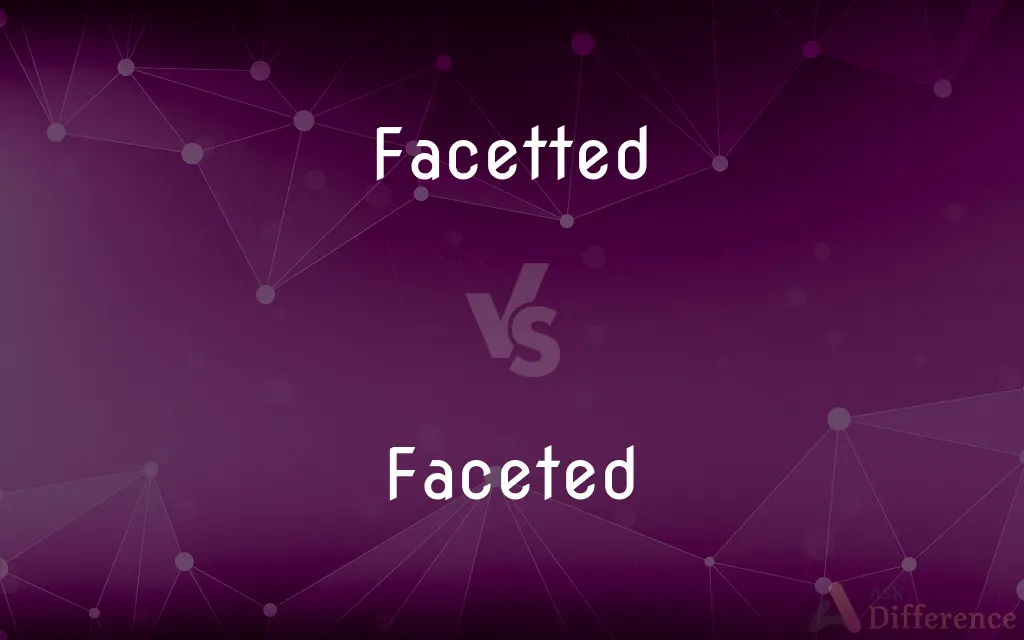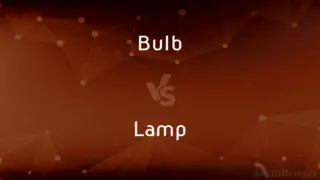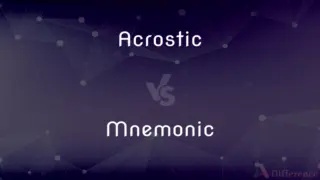Facetted vs. Faceted — What's the Difference?
Edited by Tayyaba Rehman — By Fiza Rafique — Updated on April 4, 2024
Faceted refers to having multiple surfaces or aspects, while "facetted" is a less common spelling of the same term.

Difference Between Facetted and Faceted
Table of Contents
ADVERTISEMENT
Key Differences
Faceted is the standard spelling used to describe objects, surfaces, or entities with multiple faces or aspects. "Facetted," while technically an alternate spelling of "faceted," is much less commonly used in modern English.
The use of "faceted" suggests a complexity or depth, implying that an object, idea, or person has multiple dimensions to consider. This term can enrich descriptions by conveying the intricacy or multifaceted nature of the subject.
Conversely, "facetted" serves the same function but may appear in older texts or in specific stylistic contexts where the doubled consonant is preferred for phonetic or aesthetic reasons. However, its usage does not change the meaning of the term; it merely reflects a different spelling convention.
In writing and communication, selecting "faceted" ensures clarity and adherence to contemporary standards, while the use of "facetted" may require justification based on stylistic intent or adherence to a specific publication's style guide.
Understanding the distinction between "faceted" and "facetted" is primarily a matter of recognizing spelling variations rather than differences in meaning. The choice between them reflects considerations of modern usage, clarity, and stylistic preference rather than substantive differences in definition or connotation.
ADVERTISEMENT
Comparison Chart
Spelling
Less common variant.
Preferred modern spelling.
Usage
Rare, stylistic choice.
Common in all contexts.
Meaning
Same as "faceted".
Having multiple faces or aspects.
Context
Same contexts as "faceted", often in older or specific stylistic texts.
Gemology, personality descriptions, multi-dimensional issues.
Recommendation
Use with consideration for style or historical context.
Use for clarity and modern adherence.
Compare with Definitions
Facetted
Having many sides.
The jewel's facetted edges glittered under the light.
Faceted
Having many sides.
A well-cut diamond is highly faceted to enhance its sparkle.
Facetted
Varied aspects.
The facetted discussion spanned multiple topics.
Faceted
Complex personality.
She's a faceted individual with diverse interests.
Facetted
Multi-dimensional.
The facetted analysis offered new insights.
Faceted
Intricate design.
The faceted surface of the vase caught the light beautifully.
Facetted
Intricate design.
The lamp's facetted glass shade created a beautiful pattern.
Faceted
Multi-dimensional.
The faceted approach to the problem revealed complex solutions.
Facetted
Complex personality.
His facetted nature makes him unpredictable.
Faceted
Varied aspects.
The debate was faceted, covering several critical issues.
Facetted
One of the flat polished surfaces cut on a gemstone or occurring naturally on a crystal.
Faceted
One of the flat polished surfaces cut on a gemstone or occurring naturally on a crystal.
Facetted
(Anatomy) A small, smooth, flat surface, as on a bone or tooth.
Faceted
(Anatomy) A small, smooth, flat surface, as on a bone or tooth.
Facetted
(Biology) One of the lenslike visual units of a compound eye, as of an insect.
Faceted
(Biology) One of the lenslike visual units of a compound eye, as of an insect.
Facetted
One of numerous aspects, as of a subject.
Faceted
One of numerous aspects, as of a subject.
Facetted
Having facets.
Faceted
Having facets.
Facetted
Simple past tense and past participle of facet
Faceted
Simple past tense and past participle of facet
Faceted
Having facets.
Faceted
Having facets;
A faceted diamond
Common Curiosities
Is there a difference between faceted and facetted?
The difference is only in spelling; "faceted" is the preferred and more common form.
What does faceted mean?
Faceted means having multiple sides, surfaces, or aspects, indicating complexity or depth.
Can "faceted" describe something other than physical objects?
Yes, it can describe abstract concepts or entities with multiple dimensions or aspects.
Why is "faceted" preferred over "facetted"?
"Faceted" is preferred for its brevity, modern usage, and consistency with English spelling conventions.
Does the spelling variation impact the pronunciation?
No, both spellings are pronounced the same way.
Can a personality be described as faceted?
Yes, describing a personality as faceted implies it has multiple, complex aspects.
How can understanding faceted perspectives benefit discussions?
Recognizing faceted perspectives can lead to more nuanced, comprehensive discussions and solutions.
How is "faceted" used in gemology?
In gemology, "faceted" describes a gemstone cut into multiple flat surfaces to enhance its appearance and brilliance.
Does the choice between "faceted" and "facetted" affect readability?
Yes, using "faceted" ensures clarity and adherence to contemporary standards, making texts more accessible to a wider audience.
Why might someone use "facetted" in writing?
They might use it for stylistic reasons, to adhere to a specific style guide, or in historical texts where this spelling was more common.
Is "facetted" considered incorrect?
Not incorrect, but "facetted" is less common and may be seen as a stylistic or regional variation.
Does "faceted" imply a positive or negative characteristic?
It's neutral, indicating complexity without an inherent positive or negative quality.
Are there rules for when to use "faceted" vs. "facetted"?
The main rule is to prefer "faceted" for clarity and modern usage, although "facetted" might appear in specific stylistic contexts.
Are faceted descriptions important in literature?
Yes, faceted descriptions can add depth and complexity to characters, settings, and narratives in literature.
How do faceted surfaces interact with light?
Faceted surfaces reflect and refract light, creating patterns and enhancing the object's visual appeal.
Share Your Discovery

Previous Comparison
Bulb vs. Lamp
Next Comparison
Acrostic vs. MnemonicAuthor Spotlight
Written by
Fiza RafiqueFiza Rafique is a skilled content writer at AskDifference.com, where she meticulously refines and enhances written pieces. Drawing from her vast editorial expertise, Fiza ensures clarity, accuracy, and precision in every article. Passionate about language, she continually seeks to elevate the quality of content for readers worldwide.
Edited by
Tayyaba RehmanTayyaba Rehman is a distinguished writer, currently serving as a primary contributor to askdifference.com. As a researcher in semantics and etymology, Tayyaba's passion for the complexity of languages and their distinctions has found a perfect home on the platform. Tayyaba delves into the intricacies of language, distinguishing between commonly confused words and phrases, thereby providing clarity for readers worldwide.














































